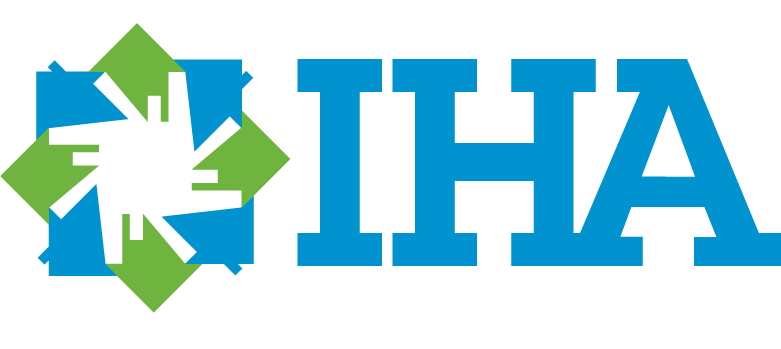Planning for Financial Success: Spending (Your Tax Refund) Wisely
Planning for Future Financial Success:
Spending (Your Tax Refund) Wisely
April is National Financial Literacy Month!
This is a fantastic reminder to check in on our financial situation and enhance our skills. April is also the perfect time to discuss finances as it overlaps with the tax season and many individuals receive a tax refund. Are you unsure what to do with those extra dollars you are receiving? Then look no further. Below you will find some helpful tips/suggestions on planning for future financial success through spending wisely.
IHA will be hosting the first of a three-part webinar series in April to discuss this topic in further detail. Please read to the end to see how to sign up for this free resource!
Reducing Debts
The first place to consider spending your tax refund wisely is to pay down your debts, especially credit card balances. Credit card interest rates have been climbing quickly over the past year and reducing these expenses could result in easier and faster savings for future financial goals or to establish an emergency savings account. High credit card balances have a negative impact on your credit score. Lowering your credit card balances to 30% or less of your total credit limit will improve your credit score. Having a better credit score could open many more opportunities for you in the future, whether it’s being qualified to rent an apartment or being eligible for the best interest rate on a loan. The quickest way to see all your credit card debts in one place is to pull a copy of your credit report. There are free options online, or you could attend an IHA Credit Café Workshop for free too.
Trying to pay off debt can be overwhelming, but there are strategies that can help. There are two well-known approaches to reducing your debt known as the ‘snowball method’ and the ‘avalanche method’ which each have their own set of pros and cons. One isn’t any better than the other, so you will want to review each method to see which one would better motivate you to reduce your debts.
- Snowball Method – This method is where you start by paying off the smallest of your balances as quickly as possible. Then with that bill paid off, you can use the money you were spending on that bill and put it towards the credit card that now has the smallest balance. You would continue this process until all your credit cards are paid off. This method may provide quicker successes with paying off the smaller balances early, while waiting to tackle the bigger ones. This sense of accomplishment might be the motivation you need to keep going.
- Avalanche Method - This method would require you to know the account balances and their associated interest rates. The first account you would pay off would be the one with the highest interest rate, regardless of the amount you owe. Like the snowball method, once that account is paid off, you would move onto the account with the next highest interest rate. This method should help you pay less overtime since you address the higher interest rates, however if the account with the highest interest rate is also your highest balance, it may take longer to see results and feel that sense of accomplishment.
Establishing Credit
Maybe you don’t have credit card debt, which is great, but if the reason is because you don’t have any credit cards, you may want to set aside about $500-$600 of your tax refund to establish new credit. We recommend doing this for two reasons – having and managing your current credit properly are the best and easiest ways to increase your credit score! And, as mentioned above, a good credit score can open doors to financial opportunities. Plus, having some available credit can be a lifesaver when unexpected emergencies occur.
There are two secured credit card offers out there specifically designed to help establish and build credit and they don’t charge an annual fee:
https://www.discover.com/credit-cards/secured/
https://www.capitalone.com/credit-cards/platinum-secured/
If you manage these cards wisely, they will become unsecured after 6-12 months and then you can put the deposit you were required to make initially into your future goals or emergency savings.
It is important not use these cards if at all possible (except for the first small purchase that you make to ensure they are active) because they will have very high interest rates. Remember, you are getting these cards to establish credit – not to use credit!
Eliminate Bank Fees
If you are currently paying bank fees because you haven’t met the minimum deposit or balance requirement, and you don’t want to switch to another bank, use a portion of your tax refund to meet the deposit requirement. I know $5 a month doesn’t seem like much, but it is essentially money thrown away. If you dropped a $5 bill you wouldn’t just walk on by, would you?
Buy in Bulk
If you tend to live paycheck to paycheck and only have enough cash on hand to buy what you need for the week, set aside a portion of your tax refund to help you get out of that cycle.
You are probably already aware that not everything you need from the grocery store is on sale every week. You also know how seldom you see something you do need regularly available at a highly discounted price. By adding a cushion to your grocery budget, you can stock up on sale items!
For example, let’s talk about facial tissues. My 2-person household uses 100 tissues per week. Typically, that box of tissues runs at least $3.00 at the grocery store. However, every once in a while, the same box sells for $1.25 – 4 boxes for $5.00. I can buy an entire year’s worth of tissues for $65 – a $91 savings!
There are lots of products that lend themselves very well to bulk purchasing. Another frequently purchased product instantly comes to mind. Canned soup! I can pay $2.79 per can when not on sale, or I can buy in bulk when on sale for just 99c a can.
If you put $1,200 of your tax refund aside to spend on regularly purchased products when they go on sale, you can easily turn that $1,200 into a $3,600 savings on groceries over the course of a year. The trick is finding places to stash your purchases.
Plan (and Pay) for a Vacation
We all deserve at least one vacation a year, right? But, when money is tight, your vacation may turn into a staycation, or even worse, get postponed another year.
That tax refund could be your literal ticket to someplace else you have always wanted to visit and for less than paying for your vacation by using credit.
By earmarking a specific dollar amount for vacation and then taking the time to research and plan for your trip – you can enjoy your getaway. In fact, you will probably enjoy it even more because you know it is all bought and paid for up front!
With credit rates averaging 20%, a $3,000 vacation could easily end up costing you $375 more dollars in interest, assuming you are paying 1/12 per month ($250) to pay it back. And, it will take 15 months to pay it back, not 12.
Plus, by doing this now, assuming you have been budgeting for an annual vacation, you can now do it every year because next year you will have saved the money you would have been paying every month to pay off that vacation.
"An investment in knowledge pays the best interest."
- Benjamin Franklin
As we mentioned earlier, we will be offering a webinar in April (the first of three planned for 2023) to help you with Planning for Future Financial Success. Please visit https://www.interfaithhousing.org/Financial-Literacy-Webinar-Series to register!
You can also take advantage of the workshops and financial education programs we offer right now. For more information, please visit https://www.interfaithhousing.org/programs




